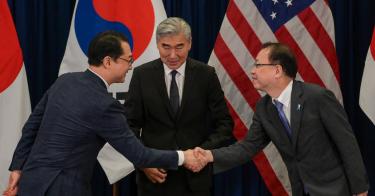North Korea has ratcheted up its military activity to unprecedented levels this year. In addition to a record number of missile launches, it has conducted highly provocative ground, air and naval actions near its border with South Korea.
Pyongyang was seeking to intimidate the United States and its allies, but it triggered bolder allied actions, including the resumption of large-scale military exercises after a hiatus of roughly five years.
North Korea has steadily improved both the quality and quantity of its nuclear and missile arsenals in recent years, unveiling nuclear-capable missile systems that pose an ever-greater risk to the United States and its allies. The increasing rate and diversity of missile launches show that Pyongyang is making significant progress toward implementing a more capable and flexible nuclear strategy, including preemptive strikes with strategic, tactical and battlefield nuclear weapons.
North Korean air, ground and naval operations near the border were also on a scale never seen before. These provocations, as well as Kim Jong Un’s willingness to resume missile flights over Japan, exacerbated regional tensions and risked triggering a military crisis.
>>> This Is Not the Time To Abandon North Korean Denuclearization
North Korea’s escalating military provocations are the result of its decadeslong campaign to develop a nuclear war-fighting capability and its exploitation of recent circumstances, including the diversion of international attention by Russia’s invasion of Ukraine, and deteriorating U.S. relations with China and Russia. Pyongyang knows it can rely on Chinese and Russian obstructionism at the U.N. Security Council to prevent additional punitive measures.
North Korea has often used provocations and threats to drive a wedge between the United States and its allies. Under President Yoon Suk-yeol, however, South Korea is now willing to respond to North Korean provocations with displays of military strength.
Mr. Yoon accepted the Biden administration’s request to resume large-scale combined military exercises and rotational deployments of U.S. strategic assets, both of which had been curtailed since 2018.
In late September, Washington deployed the USS Ronald Reagan, a Nimitz-class, nuclear powered supercarrier, to participate in combined naval exercises with South Korea for the first time in five years. That exercise was followed by trilateral anti-submarine drills with South Korean and Japanese ships—also the first in five years—as well as trilateral naval missile defense exercises. Just over a month ago, the U.S. and South Korea conducted their largest-ever Vigilant Storm combined air exercise, involving 240 allied aircraft flying a record 1,600 sorties.
The Kim regime in the North is expected to escalate tensions still further by conducting its seventh overall nuclear test, which would precipitate even more robust allied military responses. It is expected that the next nuclear test will be of a new generation of smaller tactical nuclear weapons for battlefield use, which would exponentially increase the threat to South Korea and Japan as well as to U.S. forces stationed there.
The U.S. and its allies must respond resolutely to future regime provocations as well as restore military exercises to pre-2018 levels to enhance deterrence and defense.
>>> North Korea’s Increasing Nuclear and Missile Threat to the U.S. and Its Allies
North Korea’s growing ICBM threat to the U.S. homeland requires that Washington maintain plans to augment the number of missile defense interceptors stationed in Alaska and California.
Washington also should encourage ongoing South Korean and Japanese efforts to further enhance bilateral security cooperation despite lingering tensions from long-standing historic and sovereignty disputes between those two nations.
But South Korea and Japan increasingly question the viability of the U.S. commitment to their defense both because of Pyongyang’s increasing ability to target the United States with nuclear weapons and because of previous U.S. threats to remove forces from the region.
Washington should affirm its commitment to its extended deterrence guarantee, while pushing back against growing South Korean advocacy for developing its own nuclear weapons. Washington and its allies must respond resolutely to North Korean incitements while simultaneously seeking ways to reduce the potential for stumbling into war.
This piece originally appeared in The Washington Times



